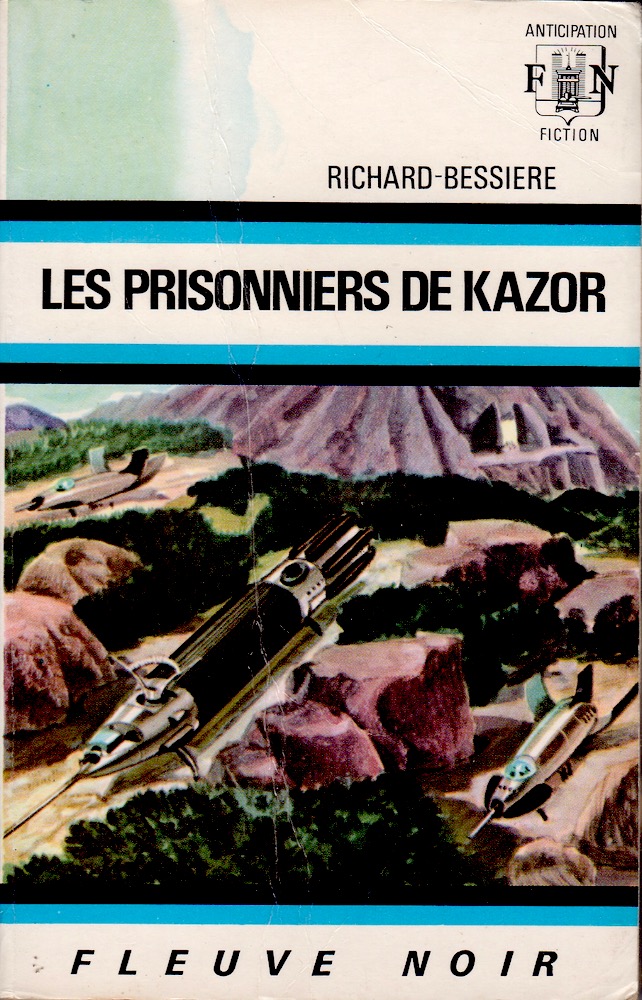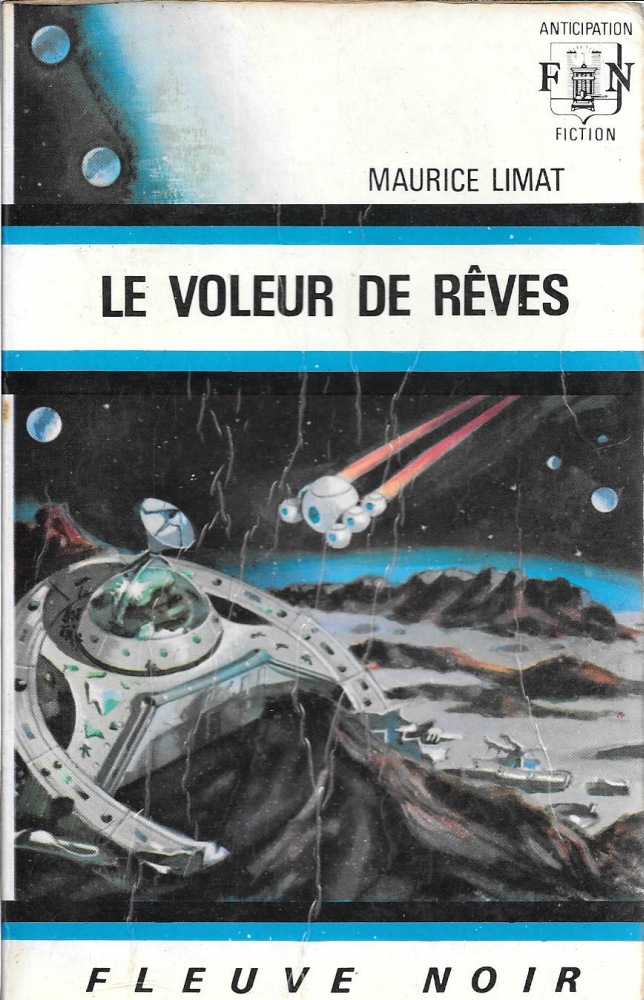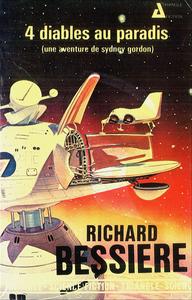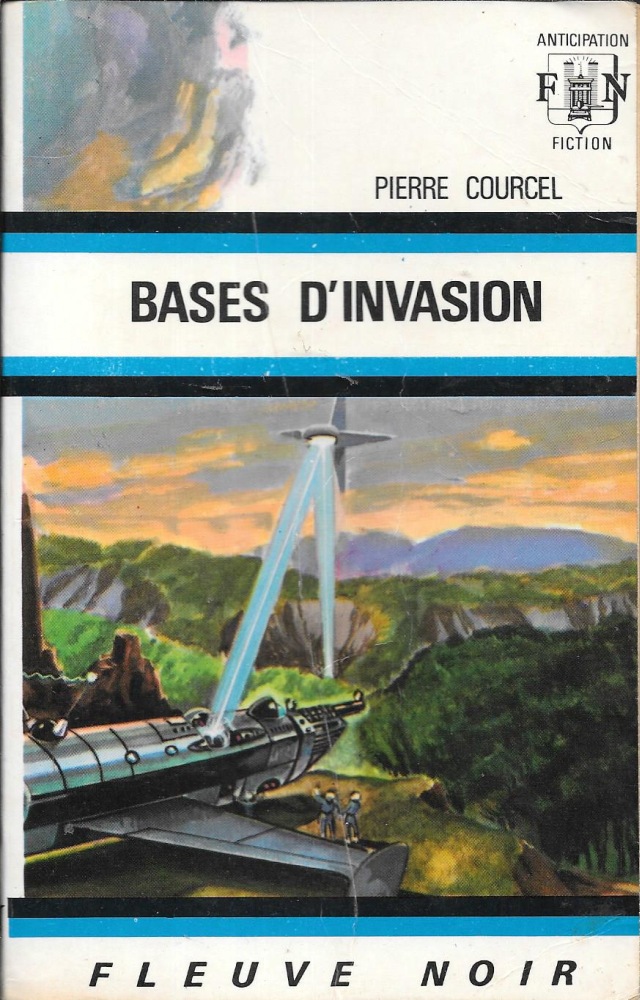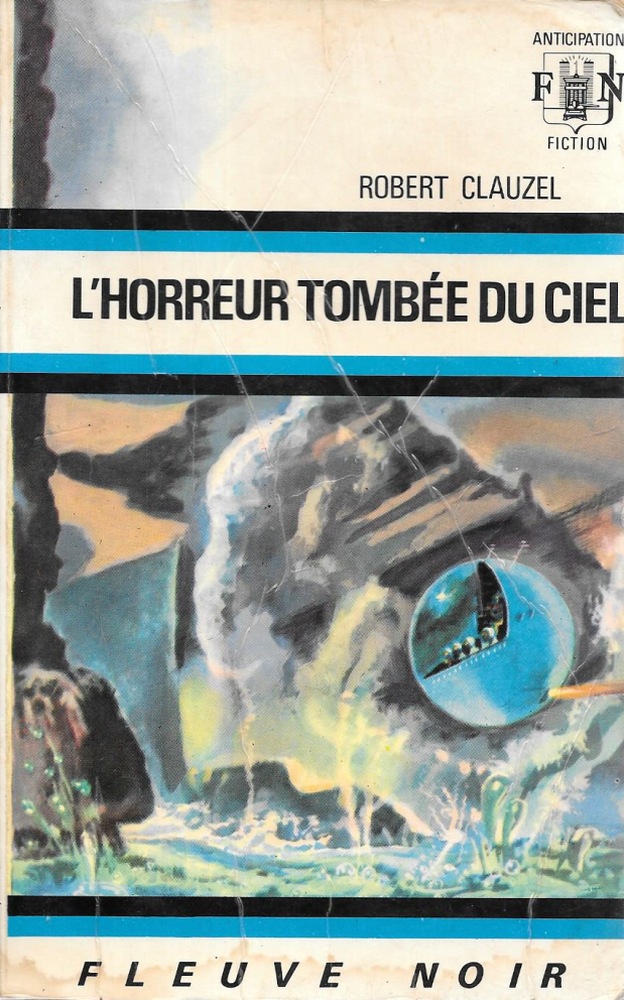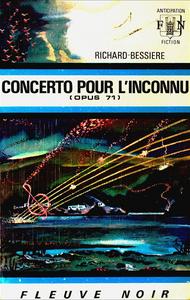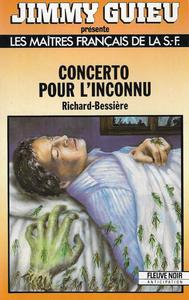L'Horreur Tombée du ciel - by Robert Clauzel Fleuve Noir #455
Lousy cover. Even by the naff standards of Fleuve Noir covers of the period this is rectangle of blobby nothing.
Germain Laurent, architect and rally driver (neither of these occupations feed into the events of the story) stops off for a drink at his local Relais Routiers. It's late winter, cold and dreich. On the drive home his car breaks down and as he's fixing it something big and glowing and weird descends from the sky in the field nearby. It's like a huge cage with a glowing ball on top. 'Things' start coming down the translucent bars of the cage to the ground. Then, suddenly, it's gone.
He reports the incident to the police who don't believe him but, next morning do their duty and go over the ground with him. They find nothing.
Germain becomes obsessed with the idea that, though there was nothing to be seen above ground, maybe there is something buried in the field. He rents a room in the inn sees another glowing light out of his window hovering over the same place. He starts digging holes and trenches in the field. Eventually he find a strange huge gelatinous blob. He takes photos of it - it doesn't show on film! Channier, the patron of the inn, is an SF fan (he's 'read everything by Richard-Bessier') accompanies Germain to verify his story. The blob is there. It dissolves half the shovel they poke at it... then all of Channier when he touches it.
This time the police take Germain a little more seriously - but, because the blob has vanished, now think he's a homicidal nutjob who has killed Channier and buried him. They are doing a reconstruction of Germain' account of events when suddenly the blob heaves up out of the ground. Germain yells, "Don't touch it!" One of the cops does - and vanishes even faster than Channier did. "Holy sh*t!" say the rest of the cops and run away.
This first part wasn't bad things were set up nicely characters (who it turns out we don't meet again) are gently introduced the ambience is suitably gloomy and paranoid - there are implications that the police are following Germain, or is someone else? There's a mood of uneasy weird.
Part 2
A short while later the combined military scientific might of the word has thrown a re-enforced concrete bunker around the THING and are alternately throwing bombs at it or studying it depending on how they are feeling that morning. Nothing seems to affect it in any way. Other different THINGS appear forcing their way though the concrete and fuse with it. Internal changes take place and the THING starts to subdivide. The science types conclude it is an organism and what they are seeing is fertilization and embryonic development.
People start acting oddly. Knife fights break out and there is more than one murder. A character staggers into the book through a doorway strangely coppery coloured, collapses and disintegrates into metallic lumps, then sand which then vanishes as if it had never existed. That's a bit rum. It's pretty soon worked out there's an inverse square law thing going on and the nearer the THING you get the worse things get.
Experts from all nations are assembling a vast machine to bombard the THING with quarks. (Because quarks had only just been discovered three years before the book was written and sounded really science fictiony - especially if you could fire them in a concentrated laser-like beam at an alien THING... )
Germain is still involved in the investigation - why isn't explained, though who knows when the particular skill set of architect and rally driver might be required. Not having a lot to do he goes to visit a professor who has written books on UFOs. Maybe he's got some ideas.
"I can't help you but maybe I know someone who can!" says the kindly, sad old professor.
"Really?"
"Yes! you see my daughter married a reporter and they were on an expedition to south America but they vanished... and we all thought they were lost but then I started getting communications from her over the computer. They met some aliens and now live on the other side of the universe, hundreds of light years away, in a society thousands of years in advance of ours!"
At this point any sane character would have been edging out of the door resisting the speaker's efforts to shove leaflets in their pockets. Any sane reader would turn to the book's cover to see if they were reading the sequel to something - or look for one of the thuddingly obvious footnotes French pulps go in for*. I found neither which made this the weirdest, most blatant, out of the left of leftfield piece of WTF?!ery I have read for a while. Anyhow, Germain thinks this is all perfectly unsurprising and suggests that they ask the nice aliens if they have any advice.
The reply is pretty instantaneous as the aliens have tapped into the Omnichron field which resonates quasi-instantaneously across the entire universe:
Their message boils down to: "Ho boy are you guys in trouble! Okay don't do anything stupid and we'll nip over and see what we can do."
Back at the bunker the quarkinator is just about ready when the professor arrives with a new message from his friends.
"When we say "don't do anything stupid " we mean don't fire quarks at it. For heaven's sake don't fire quarks at it! That's the last think you should do!"
The scientists have no idea who this madman is.
"What? Who are you?"
"I write books on UFOs and my friends from the other side of the galaxy have sent me a message..."
"SECURITY...!"
Needless to say the scientist power up the quarkinator, zap the THING and instantly vaporise themselves, their equipment, the bunker, and just about everything else in a half kilometre radius. Apart from the THING. The THING just sits there, subdividing, and growing bigger, as if nothing has happened.
The aliens arrive on time and we are told (in a footnote) that we are in fact reading a sequel and the whole daughter going off into space with aliens thing didn't come from quite as far out leftfield as it had first appeared.(Though telling us this on page 182 was odd.) It turns out the quarkinator has done more than blow a hole in a field in France. I has also shifted the entire solar system to somewhere else and the sun is 'in the wrong constellation', glaciers grow at extraordinary rates, sea levels drop, snow blankets the tropics, wolves prowl around even the biggest cities. It's the end of the world, folks.
But!
The arrived aliens and their human friends don't actually do much to help apart from info dump that this sort of thing has happened before and possibly in our solar system too. One of the assembled scientists has a rush of brains to the head as he watches one of the female characters admiring themselves in a mirror (women eh?) he notices the lettering on her jacket is reversed. (Scientists, where would we be without them?) What if....! Every molecule, he theorises, has a right and left hand version. What if this THING has chosen Earth to breed because our chemistry is right-handed? If we could (to misquote Doctor Who) 'reverse the polarity of the nutrient flow' and feed it a diet of pure left-handed molecules?! It's crazy but it might just work! Soon 200k litres of left-handed amino acid soup have been knocked up and delivered in giant tankers. Luckily the THING is sitting at the bottom of a huge crater (thanks to the quarkinator) so all they have to do is pour it in and hope it doesn't soak away too quickly. How to deliver this anti-gazpacho? We could get someone to take a pipe to the edge of the pit and drain each tanker in turn - thus avoiding prolonged exposure to the short-range malevolent psychic evil emanating from the THING - or - we could get our hero to reverse each of the five tankers one by one to the increasingly fragile edge of the pit and open the tap on the back of each one in turn...
Guess which option they go for. Go on, guess!
After five trip our hero falls into the pit, is seduced by the short range malevolent psychic evil emanating from the THING, and swims towards it only pausing at the last second as the minor female character who he has the hots for cries "Don't do it!" from the edge of the pit. He passes out.
Heroes in Fleuve Noir books often pass out in the final chapter to then wake up and have all the plot resolving stuff that happened while they were unconscious explained to them.
The THING is dead, the Solar system is(somehow) back where it should be and the friendly aliens have gone back whence they came but not before one of them has waffled on for a couple of pages about an 'Endless war between Being and Anti-Being creatures', and how the THING that had landed on his home world had destroyed it totally and left it the cloud-shrouded hell that we Earthicans know as 'Venus'. Did I, wonders the hero as he contemplated the thinly-disguised religious metaphor hidden behind all the endless war between Being and Anti-Being creatures guff, did I when I was in the pit about to touch the THING... did I really smell SULPHUR? (Three Dramatic Chords Here!)
FIN
I'm glad that one's over. The first couple of chapters were nice and moody and were setting things up nicely but what it set up was crap and not worth the effort.
*Instead of the kind of discrete superscript asterisk you find in Anglophone books, French Pulps bludgeon you with a three, full-size character marker like this: (1).
(1) Authentique!



